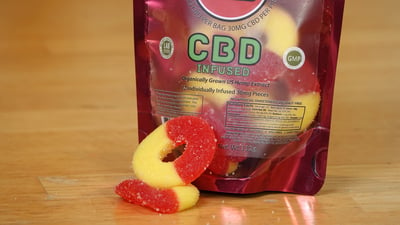Hemp Packaging: Genius Ways To Avoid Mislabeling CBD Products
Supply Chain Services/ Contract Packaging | Packaging Design
The CBD market now includes an impressive catalog, from edibles, butter, and balms to full-spectrum CBD oil. As the industry continues its meteoric climb, manufacturers have rushed to market their products.
Packaging and labeling are two items that are often overlooked when looking to capture a wider fan base. In an effort to break into the market quickly, product marketing strategists focused on promising exciting effects at the expense of accuracy. This resulted in the Federal Trade Commission (FTC) and the Food and Drug Administration (FDA) getting involved.
This article will provide examples of labeling mistakes you want to avoid in the hemp industry. It will also provide some guidelines for the proper labeling of your CBD products.
The CBD Mislabeling Crisis Today
There is a rising concern in the CBD industry around product labeling and packaging. Years before legalization, the potency of cannabidiol helped fuel the cause of various advocacy groups. Today, misrepresentation, exaggeration, and unsubstantiated health claims are target marks wounding the industry altogether.
Mislabeling CBD Products Results In FDA, Congress, and Medical Fraud
The word cannabis refers to all compounds derived from the cannabis Sativa plant. Popular compounds are tetrahydrocannabinol (THC) and cannabidiol (CBD). But, there are other compounds like cannabinol (CBN), cannabigerol (CBG), and cannabichromene (CBC).
This all sounds pretty technical, but here’s what you need to know. CBD products that can be legally sold must have a low (less than 0.3% on a dry weight basis) THC concentration.
State-specific regulations may necessitate that manufacturers present a Certificate of Analysis (COA). This shows a thorough laboratory analysis of the product’s composition. It also includes information about farming characteristics where the plant was grown (i.e., pesticides and contaminants).

The FDA, together with the FTC, works towards the lawful marketing of CBD. Congress authorized the FDA to analyze and quantify CBD products before they roll out to the public. Under the Federal Food, Drug, and Cosmetic Act and section 351 (Public Health Service Act), before marketing, CBD products must go through the FDA drug laboratory testing for human or animal use.
In 2020, new FDA testing showed that 86% of the 78 CBD retailers violated the prescribed packaging requirements. A staggering number of those tested contained THC, while others swung under or over their declared CBD percentage.
The FDA’s study involved 102 products. 18% contained less than the declared CBD amount, 37% contained more than the published amount, while 49% contained THC. THC has psychoactive properties known to give off the feeling that you are “high.” Several consumer accounts report that they were not prepared, nor were they comfortable when they used THC products.
Misrepresenting the contents of CBD products is a form of medical fraud. Consumers can be put at risk. Side effects, interaction with other medications, purity, and potency of a CBD product are all major health concerns that arise from mislabeling.
Ways That CBD Products Are Mislabeled
CBD companies are not alone in having their labels audited. After all, the FDA has authority over all consumable products sold in the country. In general, CBD mislabeling practices can be categorized into four types.
Health Claims With No Substantial Medical Studies
The FDA has not approved the cannabis Sativa L. plant for any medical use. It has only allowed several drugs with cannabinoids like Epidiolex, Marinol, and Syndros. The rule of thumb is if a health claim is not yet FDA-approved, don’t advertise it to avoid any enforcement actions.
Often these health claims involved serious health conditions such as:
- Heart disease
- Alzheimer’s disease
- Hypertension
- Cancer treatment
Deceptive Marketing Claims
This is any fraudulent marketing information found on all marketing collateral and campaigns. This may include digital and traditional marketing.
False Product Labels
Types of compounds present, percentage, dosage, and composition found on the packaging must accurately reflect the products sold.
Disclosure
Failure to disclose additional information such as sourcing, side effects, possible contraindications, and other urgent health information (i.e. driving, operating heavy machinery, and emergency facts).
.jpeg?width=400&name=cbd%20products%20(2).jpeg)
How To Overcome The Mislabeling Crisis
With every kind of business crisis, there are smart solutions designed to bring forth a new era. Let’s take a look into packaging and health claims.
Standardize Your CBD Packaging
CBD retail products mostly include oils, tinctures, capsules, tablets, gummies, vape liquids, conventional foods (candy, coffee, juice), and topicals (salve, balm, gel). There are plenty of moving parts in manufacturing. This includes distribution, raw materials acquisition, storage, marketing, and federal compliance, among others.
To simplify your process, follow these steps:
- Avoid making health claims that your product can treat, prevent, manage, or mitigate any serious disease.
- Review interstate policies if your products are produced or sold in several states.
- If your products are readily accessible to consumers and available for online purchase, audit all published content that mentions any health claim.
- Manage all customer feedback and complaints. Treat these seriously, cautiously, and responsibly.
Companies need a simplified approach to comply with CBD packaging requirements. Contract packaging and standardized labeling solutions have been proven to be smart business decisions. The CBD industry is a crux of time-sensitive information. Standardized labeling can help your company address customer-specific label changes or state-specific branding requirements.
On the other hand, contract packaging helps you cut costs and access greater efficiency. By outsourcing your packaging requirements, you can lessen contamination risks, faulty packaging, and substandard management.
Upfront, standardized labeling solutions and contract packaging sound like additional expenses. But overall, when you minimize labeling errors and inconsistencies, you get complete visibility and control across the supply chain. You can move your products faster and more efficiently, improve consumer approval, and avoid FTC and FDA sanctions.
Interested in contract packaging for hemp and CBD applications?
Truthful CBD Labeling
Labels are important not only because they can inform and protect the consumer. They also help manufacturers track what they make publicly known. In terms of health claims, data is rapidly changing.
In terms of clinical evidence, remember the following:
- At present, clinical data do not support CBD as a cure for Parkinson’s disease, schizophrenia, cancer palliation and treatment, chronic pain and spasticity, depression, anxiety disorder, insomnia, and inflammation.
- There is still inconclusive evidence to say that CBD can be effective for Bipolar disorder, Crohn’s disease, diabetes, dystonia, Huntington’s disease, multiple sclerosis (and its muscle spasms, tiredness, bladder control, the ability to move around, or well-being and quality of life), schizophrenia, nerve damage in the hands and feet (peripheral neuropathy) and other conditions.
- Scientific papers that discuss the pros and cons of CBD have been published and are now available online on the National Library of Medicine.
Packaging and labels may seem like just another segment in your company. But if neglected, deliberate, or not, it may cause bigger complexities in the long run. Diligent compliance becomes your ethical responsibility.
Where Can You Learn More About Contract Packaging For CBD Products?
Are you interested to learn more about contract packaging and what it has to offer to your CBD and hemp business? Are you curious to find out what the benefits of contract packaging are? If you would like to learn more, we suggest that you read Benefits Of Contract Packaging: Top 5 Reasons To Outsource Your Supply Chain.
This article will help you to better understand the dynamics of a contract packaging program. When you have completed reading this article, you will be able to decide if contract packaging makes sense for your CBD business or not.




